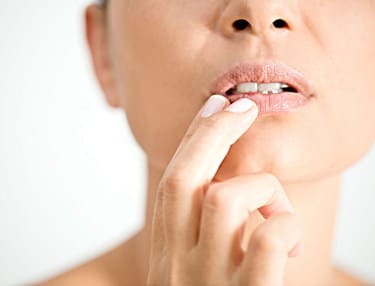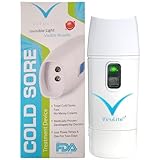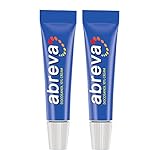Cold sores affect men and women in all age categories. Millions suffer from them every year but decide not to seek medical help because there’s no known cure. They wait for them to go away on their own, because that’s what they’ve always done, despite the fact that you can heal a cold sore much faster. Let’s find if you should keep cold sores moist or dry.
Many of those who have cold sores will turn to OTC treatments or cover them with a medicated Compeed Cold Sore Patch. This will both treat and conceal the condition, which can be a good option if you need to spend time in the company of others.Should you keep cold sores moist or dry? Most doctors believe that you should keep cold sores moist so that they don’t crack. The theory behind this is that a cold sore that doesn’t crack open is less likely to release any of the fluid that spreads the herpes simplex virus (HSV-1) to other parts of the body, or other people. Don’t forget that the virus can spread and cause cold sores around the eyes, or even spread to the brain, so you do have to be careful.
Of course, some experts believe that dry conditions can help with the healing process, such as when you have very dry or dehydrated skin. In most cases, keeping cold sores moist is the ‘safer’ option. Drying out cold sores is likely to expedite the healing process in the same way it does with acne
In this article, we will explain the pros and cons of keeping cold sores dry or moist. We’ll also identify some of the most effective treatments, such as the Virulite cold sore machine. This is an easy-to-use FDA-approved treatment that has the potential to get rid of cold sores in only three days. We recommend finding out more about how it can help you to recover faster.
Should You Keep Cold Sores Moist or Dry?
If the blisters are dry and crust over because they don’t have any moisture, your cold sores will become itchier. You may scratch the blisters or break open the crust, which is often what spreads the infection. You can make the condition worse, and there’s also a risk of other skin infections.
The other side of the argument is that, if you keep cold sores dry, they are likely to heal more quickly. Devoid of moisture, they will dry out a lot faster. There is no guarantee, but this approach does work. You will need to avoid scratching the area during itching, tingling and burning sensations. If you were to disturb the scab, you could cause new cold sores to form. If that were to happen, it would prolong the healing time, and new the outbreaks could be worse.
How Do Cold Sores Form?
Cold sores usually begin as a tingling sensation around the lips. For several hours, you will experience a strange feeling, and tiny spots will start to appear later. These will turn into blisters. The itching, tingling, and burning sensations will worsen at this stage.
The blisters will be filled with an infectious fluid. It could be a tiny cold sore if the outbreak is minimal, but some people find that half of the lip becomes blistered. While cold sores are most common in and around the mouth, they can also appear on the cheeks, nose, and chin.
Over the next few days, the blisters will burst open, ooze fluid, and a crust will develop. The crust will dry up, and the blisters will start to heal. You won’t ‘normally’ experience any scarring once they’re gone, but scars do happen sometimes.
Now that you know about all of the symptoms and the various stages of cold sores, you’ll understand why keeping cold sores moist can be beneficial. Using topical solutions, like HERP-B-GONE also help to accelerate the healing process.
How to Treat Cold Sores
There is no known cure for cold sores.
It is a virus, and even if you take antiviral medicine, there is no certainty that it will target the herpes simplex virus type 1, which is the cause of this disease. There are many triggers of cold sores. The reason may be the virus, but the facilitators are many.
Prescription Medications
You can use some prescription drugs, such as Acyclovir (Xerese, Zovirax), Valacyclovir (Valtrex), Famciclovir (Famvir) and Penciclovir (Denavir). Talk to your doctor if you’re interested in any of these options. They will tell you when and how to apply them for best results.
Over-the-Counter Treatments
Many OTC cold sore treatments will keep cold sores moist, numb the pain, and reduce time to heal.- You can apply Docosanol, better known as Abreva cream. This will moisturize the cold sore and reduce the time it takes to heal.
- Keep cold sores moist with lip balms and chapsticks. These will prevent your cold sores from cracking when exposed to direct sunlight, or new parts of the lip being infected.
- Apply a cool compress with a damp cloth. This will reduce redness and inflammation and facilitate quicker healing.
- Many people use alternative medicines, such as Lysine and zinc oxide cream.
- If you’d prefer to dry out a cold sore for faster and safer healing, you should use the Virulite Cold Sore Device or Herpotherm Heat Treatment.
How Long Do Cold Sores Take to Heal?
The use of an antiviral medicine is unlikely to protect you, but they do help you to recover faster. Cold sores heal naturally in up to 14 days.
Some people find that cold sores get worse with age. Those who suffer from frequent cold sores may experience chronic symptoms and experience several outbreaks a year. A cold sore treatment can speed up the healing process, and conceal cold sores.
Are There Any Potential Complications?
Diagnosing cold sores isn’t tricky, but the challenge arises when complications emerge.
If you have gum erosion, a sore throat, aching muscles, swollen lymph nodes, the sores may not show any signs of healing for several weeks. These symptoms are more likely to be experienced during the primary infection, rather than recurrent infections.
If you experience irritation of the eyes, have severe burns, or a viral disease (including HIV/AIDS), seeing a doctor is advised.
Are Cold Sores Dangerous?
As long as cold sores are confined to blisters on and around the lips, they are not threatening. If the infection spreads to the eyes, fingers, and brain, you should consult a doctor to discuss the various treatment options. For example, they may prescribe eye drops for ocular cold sores.
Should you keep cold sores moist or dry? If you want to heal the area quickly, keeping cold sores dry will speed up the healing process. Just be warned that it will also be much easier to spread the virus. If you keep the area moist, it will be less likely to crack or split open. The healing process will be a bit slower, but you’ll also be less likely to develop new cold sores or infect other people. It is a matter of preference regarding how you choose to proceed.
Proven Cold Sore Treatments
Here are just a few proven cold sore treatments that work. You can buy any of these online. I hope our article helped you understand if you should keep cold sores moist or dry.
- Specially formulated for cold sores/fever blisters
- Instantly relieves pain & itch
- Helps prevent infection to promote healing
- For adults and children 2 years and over
- Store at room temperature
- Number 1 Cold Sore Brand: Two 0.07 oz tubes of Abreva 10 Percent Docosanol Cold Sore Treatment
- Can Heal in 2.5 Days: Fever blister cream contains 10 percent docosanol to shorten the duration of cold sore symptoms (1)
- Nothing Heals Fever Blisters Faster: 10 percent docosanol cream penetrates deep into skin to tackle cold sores at their source (1, 2, 3)
- Lip Cream Clinically Proven to Shorten Duration of Symptoms: Cold sore product shortens duration of tingling, pain, burning and itching associated with cold sores (1)
- Portable Cold Sore Cream: Packaged in a convenient tube for on the go cold sore treatment
- FAST HEALING ultra-thin Hydrocolloid Gel provides a moist environment to help: relieve pain, reduce the blistering and prevent scabbing.
Resources
Cold sores. Mayo Clinic Web site. https://www.mayoclinic.org/diseases-conditions/canker-sore/diagnosis-treatment/drc-20370620
Hargate, G. (2006). A randomised double-blind study comparing the effect of 1072-nm light against placebo for the treatment of herpes labialis. Clinical and experimental dermatology. 31. 638-41. 10.1111/j.1365-2230.2006.02191.x.
Cernik, C., K. Gallina, and R.T. Brodell. “The Treatment of Herpes Simplex Infections: An Evidence-Based Review.” Arch Intern Med 168.11 June 9, 2008: 1137-1144.
James P McCarthy. Treatment of Herpes Labialis: Comparison of Two OTC Drugs and Untreated Controls. J Esthet Restor Dent. 2012 Apr; 24(2): 103–109.
Gerrit Schlippe. Application and tolerability of Herpotherm® in the treatment of genital herpes. Clin Cosmet Investig Dermatol. 2013; 6: 163–166.
Usatine, R. & Tinitigan, R. (2010, November 1.) Nongenital herpes simplex virus. American family physician, 82, 9, 1075-1082. http://www.aafp.org/afp/2010/1101/p1075.html
Cold sore. Health Service Executive; https://www.hse.ie/eng/health/az/c/cold-sore/complications-of-cold-sores.html
Last update on 2024-04-27 / Affiliate links / Images from Amazon Product Advertising API




